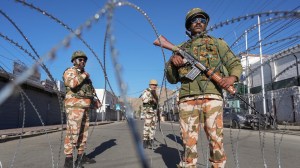The myth of a single Maratha Muslim vote
In Maharashtra, for several decades, the Congress was completely dependent on its traditional vote-bank comprising members of the minority c...

In Maharashtra, for several decades, the Congress was completely dependent on its traditional vote-bank comprising members of the minority communities, Scheduled Castes and Scheduled Tribes. But is the concept of the vote bank relevant today? Will it oblige the Congress in the ensuing Lok Sabha polls? Leading politicians and political thinkers feel that the concept of the vote bank is no longer relevant in view of the flexible politics by the non-Congress political parties.
Former Chief Minister Vilasrao Deshmukh admitted that there was steady erosion in the Congress’ vote bank. Although the Congress retains a vote bank, it has become very weak. For a long time, besides the Marathas, minorities were traditionally supporters of the Congress but now there is a drastic change.
While the older generation was firmly with the Congress, the younger generation, which constitutes nearly 60 per cent of the electorate, was undecided on their voting pattern. In Deshmukh’s opinion, while the urban population was undecided, rural folk still have complete faith in the Congress.
Senior BJP leader and former Finance Minister Eknath Khadse said the concept of vote bank has become a thing of the past. A prominent leader of the Lewha patil community in Jalgaon district, Khadse said post-1985 elections, there was growing awareness among members of the minority communities, as a result, they were moving away from the Congress owing to increasingly accommodative stances adopted by the saffron combine. Minorities were traditionally unable to accept the BJP as they viewed it as communal. “Over a period of time, we convinced them that they were misunderstanding the BJP. We ensured that they were brought into the mainstream and were treated on par,’’ Khadse added.
Secondly, Khadse said, there was an impression that Congress alone was able to run the administration, although the BJP has been able to change that assumption. ‘‘We were in power in Maharashtra for four years, we performed better than the Congress,’’ Khadse remarked.
|
Poll percentages
in Maharashtra |
|||||
|
Caste percentages • Marathas : 29 per cent Religious percentages Story continues below this ad |
|||||
State Samajwadi Party President and Rajya Sabha Member Abu Asim Azmi also believes that the concept of vote bank has lost its relevance. According to Azmi owing to an increase in the literacy rate among members of the minority communities, there has been greater awareness. No political party can take the minority vote for granted.
Political analyst Y D Phadke and Political Science Professor Suhas Palshikar also provide reasons why the vote-bank is no longer as salient as it used to be. According to Phadke, the BJP, earlier considered the ‘untouchable’ has succeeded in changing its image and in wooing leading members of minority communities. For decades, the Muslims were with the Congress, but the Emergency created a change and slowly but surely they transferred their loyalty. Now, some prominent Muslims leaders have even joined the Shiv Sena.
‘‘I feel the BJP’s flexible policy towards the Muslims has helped it to erode the traditional vote bank of the Congress,’’ Phadke added.
Professor Suhas Palshikar has carried out extensive research on Assembly as well as Lok Sabha elections after 1977, particularly on the voting patterns of minority communities, Marathas and OBCs. ‘‘In my opinion, over a period of time, there was fragmentation of the vote bank. No party was sure of its vote bank,’’ Palshikar said.
Palshikar pointed out that Marathas have traditionally been considered staunch supporters of the Congress, as a result, in the Maratha dominated areas of Western Maharashtra, there was absolutely no threat to the Congress. However, now, the Maratha community is no more the monopoly of the Congress. On the contrary, quite a large number of prominent Maratha leaders have joined the BJP and Shiv Sena.
In the 1980-89 period, younger Maratha politicians were in search of an alternative to the Congress and found it in the Shetkari Sangathana led by Sharad Joshi, while some found the Shiv Sena a more effective organisation. Their main grievance at this time was that there was no scope for younger leaders in the Congress.
Along with Marathas, members of the minority communities, SC/STs, OBCs (comprising 272 castes), Dhangar, Mali, Teli, Banjara, Vanjari, Lewha Patil and Lingayats dominate in one or the other region. Since members of these communities were representatives in many political parties, they could not build a vote bank in favour of a single party.
Take the case of NCP leader Chhagan Bhujbal, a prominent member of the Mali community. While NCP was promoting Bhujbal, the BJP promoted N S Pharande, Chairman, Maharashtra Legislative Council of the same community.







- 01
- 02
- 03
- 04
- 05
























